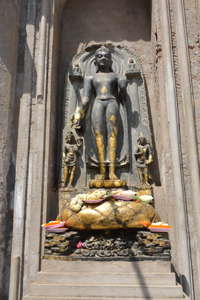
Statue of White Tara Mahabodhi Temple, Bodhgaya
Photo Credit: Rajat Sanyal

Deshkal Society (http://www.deshkalindia.com/) has been working in the thematic areas of heritage, culture, and school education through Bodhi Kendra and Bodhgaya Global Dialogues which is a platform for expression of experiences, reflections, and insights from plural perspectives at the intersections of heritage, education, and sustainability for building a future on the foundation of Buddha’s legacy of enlightenment and compassion.
In addition, Deshkal Society has been endeavoring for ensuring the effectiveness of institutions and mitigating longstanding barriers for ensuring delivery of rights and sanctions to the disadvantaged communities in general and Musahar community in particular in the Bodhgaya and its region since 2000. These themes are interwoven with each other, generating actions that deeply influenced the households of these communities. The theory of change is gender-based, and the agents of change have been women.
Social accountability strategy led by Deshkal Society has been succeeding in institutional partnership with bilateral donors, philanthropic foundations, and governmental departments like Ministry of Culture, GOI, Indira Gandhi National Centre for the Arts, International Buddhist Confederation, Indian Council of World Affairs, Ministry of Education, GOI, NITI Ayog (erstwhile planning commission), Indian Oil, National Thermal Power Corporation, International Growth Centre, DFID, World Bank, UNICEF, etc.



This view of the arts, integrated with, and essential to the larger matrix of human culture, is predicated upon Smt. Gandhi’s recognition of the role of the arts as essential to the integral quality of person, at home with himself and society. It partakes of the holistic worldview so powerfully articulated throughout Indian tradition, and emphasized by modern Indian leaders from Mahatma Gandhi to Rabindranath Tagore.
The arts are here understood to comprise the fields of creative and critical literature, written and oral; the visual arts, ranging from architecture, sculpture, painting and graphics to general material culture, photography and film; the performing arts of music, dance and theatre in their broadest connotation; and all else in fairs, festivals and lifestyle that has an artistic dimension. In its initial stages the Centre will focus attention on India; it will later expand its horizons to other civilizations and cultures. Through diverse programmes of research, publication, training, creative activities and performance, the IGNCA seeks to place the arts within the context of the natural and human environment. The fundamental approach of the Centre is all its work will be both multidisciplinary and interdisciplinary.



D-205, Sector-108
Noida-201304
Uttar Pradesh (India)
Phone/Fax - +91-120-4362163
E-mail – deshkal@gmail.com
Magadh Vihar Colony Mastipur, Near Wat Magadh Thai Monastery, Bodhgaya-824231 Bihar (India)
Phone/Fax – +91-120-4362163
E-mail – deshkal@gmail.com